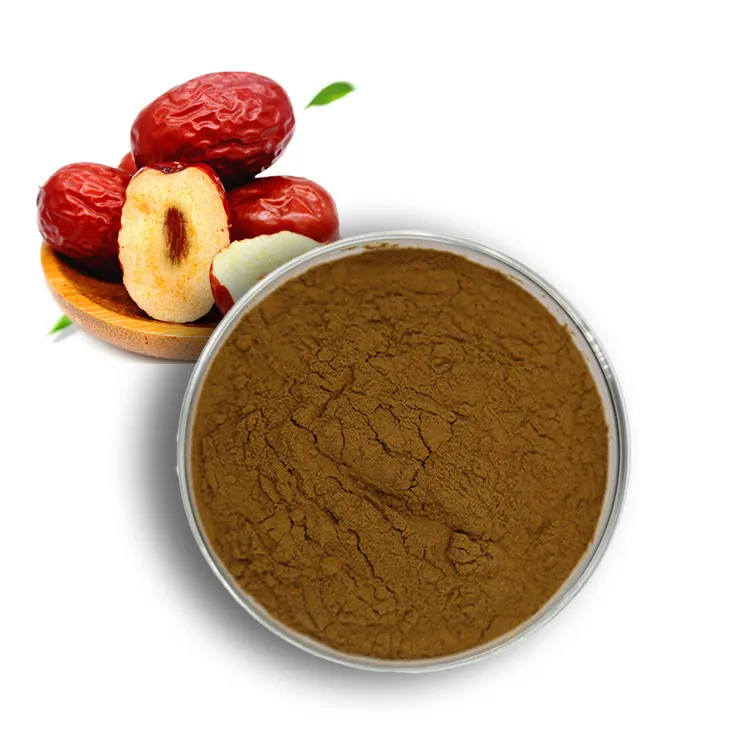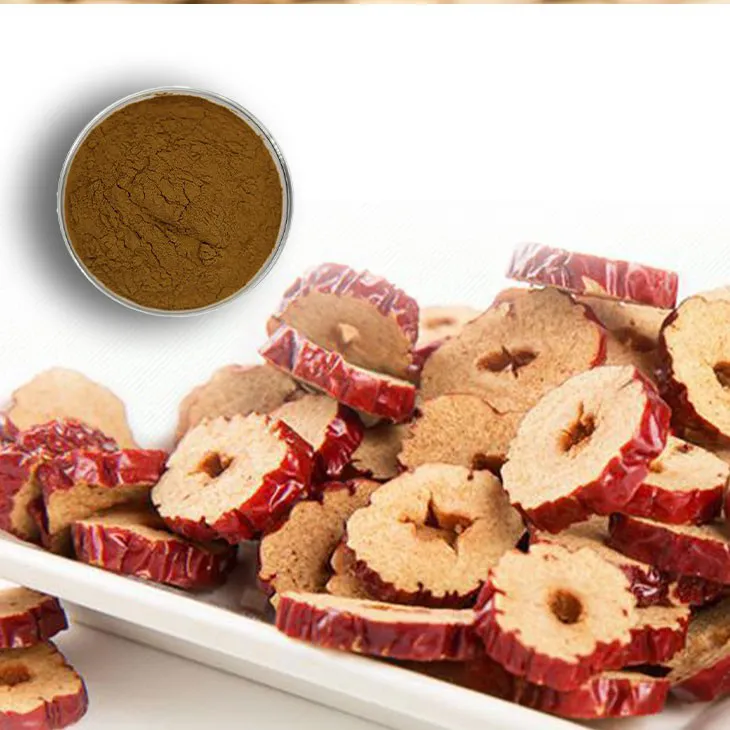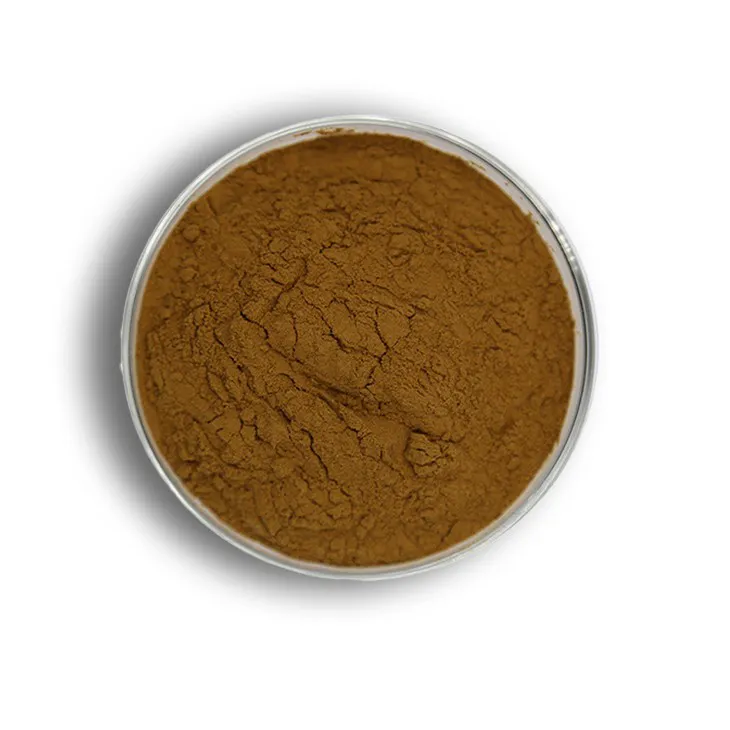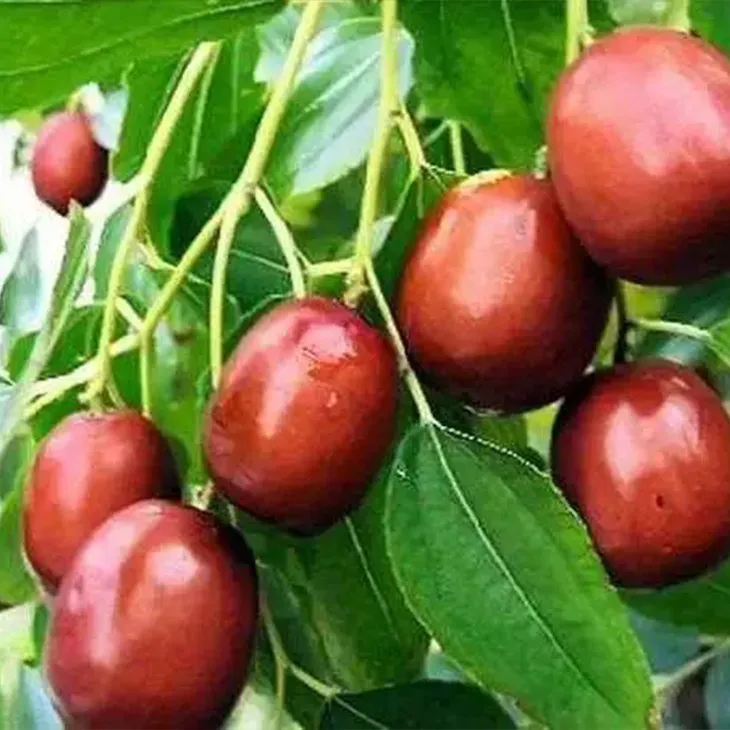- 0086-571-85302990
- sales@greenskybio.com
How to make powder from jujube extract?
2024-12-02

1. Introduction
Jujube, also known as Chinese date, has been highly valued for its numerous health - promoting properties for centuries. Jujube Extract contains a rich variety of nutrients, such as vitamins, minerals, and bioactive compounds. Converting Jujube Extract into powder has broadened its applications in various fields, including food, medicine, and cosmetics. This article will comprehensively discuss the process of making powder from Jujube Extract.

2. Selection of high - quality jujube
2.1 Origin and variety
The origin of jujube plays a crucial role in its quality. Jujubes from certain regions are known for their superior taste and nutrient content. For example, jujubes from Xinjiang in China are often praised for their large size, sweet taste, and high sugar content. Different varieties also have distinct characteristics. Some varieties may be more suitable for extraction due to their higher content of specific compounds.2.2 Maturity
Selecting fully - mature jujubes is essential. Mature jujubes usually have a darker color, a sweeter taste, and a higher content of bioactive substances. Immature jujubes may lack the full spectrum of nutrients and may have a more astringent taste. When choosing jujubes, look for those with a smooth skin and no signs of damage or decay.
3. Extraction methods
3.1 Solvent extraction
- One common method is solvent extraction. Ethanol is often used as a solvent. The jujubes are first crushed into small pieces or a paste. Then, the crushed jujubes are mixed with ethanol in a suitable ratio, usually around 1: 5 to 1:10 (jujube to ethanol by weight).
- The mixture is then placed in a sealed container and allowed to soak for a period of time, typically 24 - 48 hours. During this time, the bioactive compounds in the jujube are dissolved into the ethanol.
- After soaking, the mixture is filtered to separate the liquid extract from the solid residue. The liquid extract contains the dissolved jujube compounds.
3.2 Water extraction
- Water extraction is another option. The jujubes are boiled in water for a certain period, usually about 1 - 2 hours. This helps to release the nutrients from the jujube into the water.
- The boiled jujube - water mixture is then filtered. The filtrate is the water - based jujube extract. However, water extraction may extract some unwanted substances along with the desired compounds, and the extract may be more prone to spoilage compared to ethanol - based extracts.

4. Converting the extract into powder
4.1 Evaporation
- Once the jujube extract is obtained, the next step is to remove the solvent (if solvent extraction was used) or reduce the water content (for water extraction). Evaporation is a common method. The extract is placed in a shallow tray or a rotary evaporator.
- If using a rotary evaporator, the temperature and pressure are carefully controlled. For example, a temperature of around 40 - 60°C and a reduced pressure can be applied to speed up the evaporation process while minimizing the degradation of the bioactive compounds.
- If using a shallow tray, the extract is left in a well - ventilated area or under gentle heat (such as in a drying oven at a low temperature). The process may take several hours to days depending on the amount of extract and the environmental conditions.
4.2 Spray drying
- Spray drying is a more advanced and efficient method. The jujube extract is first diluted to a suitable concentration if necessary. It is then pumped into a spray dryer.
- In the spray dryer, the extract is atomized into small droplets. Hot air is introduced into the chamber. The hot air quickly dries the droplets, converting them into powder. The temperature of the hot air is typically in the range of 150 - 200°C, but it is important to ensure that the short drying time does not cause excessive degradation of the bioactive compounds.
- The powder is then collected at the bottom of the spray dryer. Spray drying can produce fine - textured jujube extract powder with good flowability and solubility.
4.3 Freeze drying
- Freeze drying is another option for converting the extract into powder. The jujube extract is first frozen at a very low temperature, usually - 40°C to - 80°C.
- The frozen extract is then placed in a freeze dryer. In the freeze dryer, the pressure is reduced, and the ice in the extract sublimes directly from the solid state to the gaseous state, leaving behind the dry powder.
- Freeze - dried jujube extract powder retains the maximum amount of bioactive compounds and has a porous structure, which gives it good rehydration properties.

5. Quality control and storage
5.1 Quality control
- After the powder is produced, quality control is necessary. The moisture content of the powder should be measured. Ideally, the moisture content should be less than 5% to ensure good storage stability.
- The content of bioactive compounds should also be analyzed. This can be done using various analytical techniques such as high - performance liquid chromatography (HPLC) to ensure that the powder contains the expected levels of nutrients and active ingredients.
- Microbial testing is also crucial. The powder should be free from harmful bacteria, fungi, and other microorganisms. Any contamination can lead to spoilage and potential health risks.
5.2 Storage
- Proper storage is essential to maintain the quality of the jujube extract powder. The powder should be stored in a cool, dry place, away from direct sunlight. Exposure to sunlight can cause the degradation of bioactive compounds.
- It is recommended to store the powder in airtight containers. Oxygen can also cause oxidation of the compounds in the powder, reducing its quality. If stored under optimal conditions, the jujube extract powder can have a shelf - life of up to one to two years.
6. Potential applications and benefits
6.1 In food
- Jujube extract powder can be used as a natural food additive. It can add a unique flavor and sweetness to food products. For example, it can be added to baked goods such as cakes and cookies, giving them a rich, fruity flavor.
- It can also be used in the production of functional foods. Due to its high content of nutrients and bioactive compounds, it can enhance the nutritional value of food products. For instance, adding jujube extract powder to breakfast cereals can provide additional vitamins and antioxidants.
6.2 In medicine
- In traditional medicine, jujube has been used for various health benefits. The extract powder can be formulated into herbal remedies. It may have properties such as antioxidant, anti - inflammatory, and immunomodulatory effects.
- It can also be used in the development of modern pharmaceutical products. For example, the bioactive compounds in the jujube extract powder may be studied for their potential in treating certain diseases or as adjuvants in drug therapies.
6.3 In cosmetics
- Jujube extract powder is rich in antioxidants, which are beneficial for skin health. It can be added to skin care products such as creams, lotions, and masks. The antioxidants can help to protect the skin from oxidative damage caused by free radicals, reducing the signs of aging such as wrinkles and fine lines.
- It may also have moisturizing and soothing properties, making it suitable for use in products for sensitive skin.
7. Conclusion
The process of making powder from jujube extract involves several important steps, from the selection of high - quality jujube to the extraction methods and the conversion of the extract into powder. Quality control and proper storage are also crucial to ensure the quality and stability of the final product. The jujube extract powder has great potential in various fields such as food, medicine, and cosmetics, offering a wide range of benefits. With further research and development, the applications of jujube extract powder are expected to expand even more in the future.
FAQ:
Q1: What are the key factors in selecting high - quality jujubes for extraction?
When selecting jujubes for extraction, several factors are crucial. Firstly, the ripeness of the jujubes is important. Ripe jujubes tend to have a higher content of active ingredients. Secondly, the origin of the jujubes can also matter. Jujubes from areas with good soil and climate conditions are likely to be of better quality. Additionally, the appearance of the jujubes should be considered. Jujubes without obvious damage or disease are more suitable for extraction.
Q2: What are the common extraction methods for jujube extract?
There are several common extraction methods for jujube extract. One method is solvent extraction. Different solvents such as ethanol can be used to dissolve the active ingredients in jujubes. Another method is ultrasonic - assisted extraction. Ultrasonic waves can help break the cell walls of jujubes more effectively, thus increasing the extraction efficiency. Maceration extraction is also a traditional method, which involves soaking the jujubes in a solvent for a certain period to extract the desired components.
Q3: How can the jujube extract be dried to form powder?
There are different drying methods to convert jujube extract into powder. Spray drying is a commonly used method. In this process, the jujube extract is sprayed into a hot air stream, and the water in the extract is quickly evaporated, leaving behind powder. Another option is freeze - drying. Freeze - drying first freezes the jujube extract and then sublimates the ice directly into vapor under low pressure, resulting in a powder with well - preserved active ingredients.
Q4: What are the potential health benefits of jujube extract powder in food?
In food, jujube extract powder can offer various health benefits. It can be a good source of vitamins and minerals, such as vitamin C and iron. It may also have antioxidant properties, which can help protect the body's cells from damage caused by free radicals. Additionally, it can contribute to digestive health, potentially improving the function of the digestive system.
Q5: How is jujube extract powder used in cosmetics?
Jujube extract powder is used in cosmetics in several ways. It can be added to skincare products like creams and lotions. Its antioxidant properties can help prevent skin aging by reducing oxidative stress on the skin. It may also have moisturizing effects, helping to keep the skin hydrated. In some cases, it can be used in haircare products to improve the health of the hair.
Related literature
- The Extraction and Utilization of Jujube Extract"
- "Jujube Extract Powder: Production and Applications"
- "Beneficial Properties of Jujube Extract in Different Industries"
- ▶ Hesperidin
- ▶ citrus bioflavonoids
- ▶ plant extract
- ▶ lycopene
- ▶ Diosmin
- ▶ Grape seed extract
- ▶ Sea buckthorn Juice Powder
- ▶ Beetroot powder
- ▶ Hops Extract
- ▶ Artichoke Extract
- ▶ Reishi mushroom extract
- ▶ Astaxanthin
- ▶ Green Tea Extract
- ▶ Curcumin Extract
- ▶ Horse Chestnut Extract
- ▶ Other Problems
- ▶ Boswellia Serrata Extract
- ▶ Resveratrol Extract
- ▶ Marigold Extract
- ▶ Grape Leaf Extract
- ▶ blog3
- ▶ blog4
- ▶ blog5
-
The best lemon juice powder in nature.
2024-12-02
-
Organic Vitamin K2 Powder Suppliers
2024-12-02
-
Bulk purchase of L - tyrosine.
2024-12-02
-
Vitamin K2 Manufacturers
2024-12-02
-
100% Pure Natural Rutin.
2024-12-02
-
Chinese Citrus Bioflavonoid Suppliers.
2024-12-02
-
Fenugreek Extract Powder
2024-12-02
-
Gynostemma pentaphyllum extract
2024-12-02
-
Okra Extract
2024-12-02
-
Sophora Japonica Flower Extract
2024-12-02
-
Black Garlic Extract
2024-12-02
-
Giant Knotweed Extract
2024-12-02
-
Europen Bilberry Extract
2024-12-02
-
Ivy Extract
2024-12-02
-
Selenium yeast
2024-12-02
-
Kelp Extract Powder
2024-12-02





















